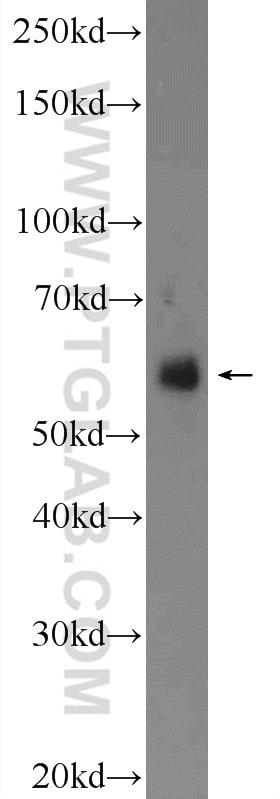VGLUT2 Polyclonal antibody
VGLUT2 Polyclonal Antibody for WB, ELISA
Host / Isotype
Rabbit / IgG
Reactivity
human
Applications
WB, ELISA
Conjugate
Unconjugated
Cat no : 25261-1-AP
Synonyms
Validation Data Gallery
Tested Applications
| Positive WB detected in | fetal human brain tissue |
Recommended dilution
| Application | Dilution |
|---|---|
| Western Blot (WB) | WB : 1:500-1:1000 |
| It is recommended that this reagent should be titrated in each testing system to obtain optimal results. | |
| Sample-dependent, Check data in validation data gallery. | |
Product Information
25261-1-AP targets VGLUT2 in WB, ELISA applications and shows reactivity with human samples.
| Tested Reactivity | human |
| Host / Isotype | Rabbit / IgG |
| Class | Polyclonal |
| Type | Antibody |
| Immunogen | Peptide 相同性解析による交差性が予測される生物種 |
| Full Name | solute carrier family 17 (sodium-dependent inorganic phosphate cotransporter), member 6 |
| Calculated molecular weight | 64 kDa |
| Observed molecular weight | 60 kDa |
| GenBank accession number | NM_020346 |
| Gene symbol | VGLUT2 |
| Gene ID (NCBI) | 57084 |
| RRID | AB_2879992 |
| Conjugate | Unconjugated |
| Form | Liquid |
| Purification Method | Antigen affinity purification |
| Storage Buffer | PBS with 0.02% sodium azide and 50% glycerol pH 7.3. |
| Storage Conditions | Store at -20°C. Stable for one year after shipment. Aliquoting is unnecessary for -20oC storage. |
Background Information
VGLUT2, also known as SLC17A6, belongs to the major facilitator superfamily. VGLUT2 is a multifunctional transporter that transports phosphate at the plasma membrane and glutamate in synaptic vesicles (PMID:33440152, 11432869). VGLUT2 is involved in neurotransmitter loading into synaptic vesicle (PMID: 11698620). VGLUT2 is predominantly expressed in adult and fetal brain, with highest expression in the medulla, substantia nigra, subthalamic nucleus, and thalamus, and low levels in the cerebellum and hippocampus (PMID:10820226).
Protocols
| Product Specific Protocols | |
|---|---|
| WB protocol for VGLUT2 antibody 25261-1-AP | Download protocol |
| Standard Protocols | |
|---|---|
| Click here to view our Standard Protocols |


